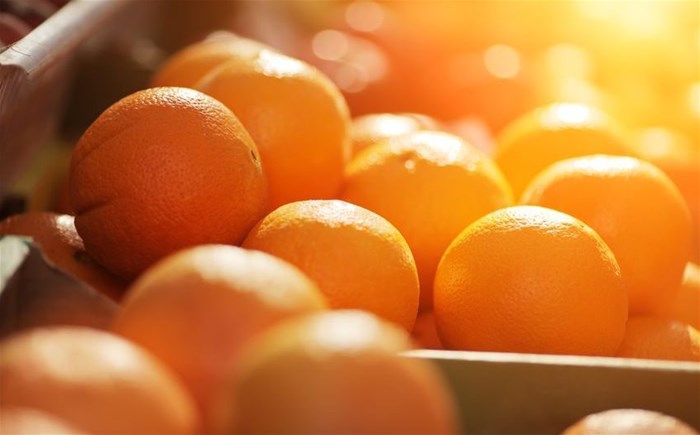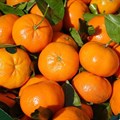The Citrus Growers Association of South Africa (CGA) and the Fresh Produce Exporters' Forum Boards have taken the decision to voluntarily close the export of Valencia oranges from Citrus Black Spot (CBS) affected areas in South Africa to the European Union (EU) starting from 16 September 2022.

Source: ©Konstantin Sutyagin via
123RFThis decision was taken in response to the 10 CBS notifications of non-compliance (NONCs) on SA citrus detected so far this season and the traditional heightened risk that Valencia oranges pose for CBS non-compliance at the tail end of the EU export season.
The market closure will be rolled out in a staggered approach, with the last day of inspections on Valencias in Northern regions on 16 September while the Gamtoos Valley [Patensie], East Cape Midlands and Sundays River Valley will close inspections on 23 September 2022. Mandarins, grapefruit, lemons and navels from CBS-free areas will not be affected.
While this closure will serve as another blow to growers who have faced one of the most challenging seasons to date, continued access to the EU market over the longer term must be prioritised, says the industry. This decision also shows South Africa’s phytosanitary CBS Risk Mitigation System being implemented effectively.
To date, 138 million (15kg) cartons of fruit have been packed for export to key markets across the world. The latest prediction is that 167.2 million cartons of citrus will be shipped by the end of the 2022 season, which is 3.3 million cartons less than what was predicted at the start of the season.
Sustainability and profitability
While these figures still show steady volume growth when compared to previous years, a number of operational and commercial challenges mean that the majority of local growers are faced with the prospect of significant earnings losses this year. Expert industry commentators are of the view that less than 20% of citrus growers are likely to achieve above break-even returns at the end of the 2022 season. This poses a major threat to the sustainability and profitability of the sector and the 130,000 jobs it sustains as well as the R30bn in export revenue it generates annually.
The most serious challenge facing growers, which is having the biggest impact on their bottom line is price hikes across a number of inputs as a result of the Covid-19 pandemic and the Russian invasion of Ukraine. For example, fertiliser prices increased just over 56% between 2020 and 2021 and fuel prices are up by 53%. Of even greater concern is record high freight rates, with shipping lines hiking their prices by 128% between 2020 Q1 and 2022 Q1.
This means growers are having to pay virtually twice as much to ship their fruit, than what it cost to produce it over the course of an entire year. In order to guard against further price hikes and ensure price stability in the future, the CGA says that it has been engaging with other fruit sectors on potentially taking control of their shipping, with a feasibility study expected to be completed by the end of September.
At the same time, there has been a decline in real export prices across all varietals which is expected to continue for the next few years.
This challenge has been further compounded by the recent unjustified and discriminatory False Coddling Moth (FCM) regulations passed by the EU, which will require exporting African countries to implement a drastic mandatory cold treatment for oranges headed to the region. These new regulations recently saw up to 1350 containers of citrus detained at EU ports for a number of weeks, which resulted in local growers incurring over R200m in losses.
The long-term enforcement of the new FCM regulations is considered a threat to the industry, which is why the WTO consultation process recently launched by the Department of Trade, Industry and Competition (DTIC) will be critically important. The CGA says that its position remains that the cold treatment prescribed within the new regulations is contrary to scientific evidence, making it an arbitrary and unnecessarily trade restrictive measure and accordingly contravenes international requirements for such phytosanitary trade regulations.
The CGA says that it will make all resources available as required by the DTIC and DALRRD during the upcoming WTO consultation process.
Industry under pressure
All of these factors along with the current economic constraints in South Africa including ongoing fiscal pressure, persistent load shedding, high unemployment rates and low levels of consumer and business confidence mean that growers are under severe pressure.
As a result, there have been instances where growers have had no choice but to dump cattle-grade fruit that is not fit for human consumption, as was the case for one farmer in the Eastern Cape recently. Where possible, growers continue to donate fruit that is fit for human consumption to communities in need, specifically when such fruit will not generate a viable return when sold fresh or processed into juice. In this regard, the CGA offered assistance to facilitate donations to communities through its Orange Heart Fruit Drive initiative.
In light of this, it is still positive news that South Africa’s ports have been operating fairly smoothly over the past few months with any blockages being addressed speedily by the relevant role players, including Transnet. The CGA continues to convene a weekly logistics response committee that identifies risks in the logistics chains and solutions to address the most urgent ones. This includes having ongoing meetings with the senior management at Transnet on the functioning of the ports.
The CGA says that it remains committed to continuing working with government and other value chain partners in order to ensure local growers are able to survive over the short-term so that the industry remains a key economic and job contributor in the country.

































